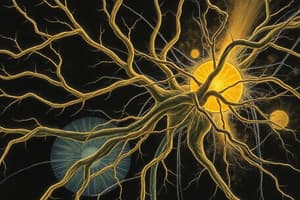Podcast
Questions and Answers
What is the primary function of the myelin sheath?
What is the primary function of the myelin sheath?
- To produce neurotransmitters
- To insulate the axon and enhance signal transmission (correct)
- To protect the axon from physical damage
- To connect neurons with muscle fibers
What are the gaps in the myelination known as?
What are the gaps in the myelination known as?
- Axon terminals
- Synaptic clefts
- Internodes
- Nodes of Ranvier (correct)
Which of the following statements accurately describes gray matter?
Which of the following statements accurately describes gray matter?
- It contains higher levels of myelin than white matter
- It is exclusively found in the peripheral nervous system.
- It is composed mainly of unmyelinated axons and neuronal cell bodies (correct)
- It primarily consists of myelinated axons
Where are receptor sites typically found in relation to the postsynaptic neuron?
Where are receptor sites typically found in relation to the postsynaptic neuron?
What is the primary reason that white matter appears white?
What is the primary reason that white matter appears white?
What is the primary function of neuroglia in the nervous system?
What is the primary function of neuroglia in the nervous system?
What is contained within the cell body (soma) of a neuron?
What is contained within the cell body (soma) of a neuron?
What role do dendrites play in the functioning of a neuron?
What role do dendrites play in the functioning of a neuron?
What is the trigger zone of an axon responsible for?
What is the trigger zone of an axon responsible for?
Which component of the neuron transmits information away from the cell body?
Which component of the neuron transmits information away from the cell body?
What do axon terminals do in a neuron?
What do axon terminals do in a neuron?
What is the function of synaptic vesicles in a presynaptic neuron?
What is the function of synaptic vesicles in a presynaptic neuron?
Which of the following substances are typically found in the presynaptic membrane?
Which of the following substances are typically found in the presynaptic membrane?
What are the two main structural divisions of the nervous system?
What are the two main structural divisions of the nervous system?
Which part of the peripheral nervous system contains cranial nerves?
Which part of the peripheral nervous system contains cranial nerves?
Which of the following correctly describes ganglia?
Which of the following correctly describes ganglia?
Which component is NOT part of the Central Nervous System (CNS)?
Which component is NOT part of the Central Nervous System (CNS)?
What type of nerves carry commands to skeletal muscles?
What type of nerves carry commands to skeletal muscles?
Which division of the PNS is responsible for monitoring the environment?
Which division of the PNS is responsible for monitoring the environment?
What is the primary function of neurons in the nervous system?
What is the primary function of neurons in the nervous system?
Which of the following is a functional division of the nervous system?
Which of the following is a functional division of the nervous system?
Flashcards are hidden until you start studying
Study Notes
Nervous System Divisions
- Two Divisions: Structural and Functional
- Structural: Central Nervous System (CNS) and Peripheral Nervous System (PNS)
- CNS: Brain and Spinal Cord
- PNS: All nervous tissue outside the CNS, including cranial nerves (12 pairs), spinal nerves (31 pairs), receptors, ganglia, and nerve plexuses.
- Functional: Sensory and Motor
- Sensory: Carries information from receptors to the CNS
- Motor: Carries commands from the CNS to effectors
- Structural: Central Nervous System (CNS) and Peripheral Nervous System (PNS)
Neuron Structure
- Neuron Components
- Cell Body (Soma): Contains nucleus and organelles, responsible for protein synthesis and cell function
- Perikaryon: Area around the nucleus containing organelles
- Nissl Bodies: Free ribosomes and rough ER, involved in protein synthesis
- Neurofibrils: Intermediate filaments that provide structural support
- Dendrites: Branched extensions of the cell body, receive input from other neurons and transmit graded potentials
- More dendrites mean increased input
- Axon: Conducts action potential, carries information away from the cell body
- Trigger zone: Start of the axon where action potential begins
- Axolemma: Axon's cell membrane
- Axoplasm: Axon's cytoplasm
- Axon collaterals: Branches of the axon
- Telodendria: Extensions of the axon, terminate at axon terminals
- Axon Terminals: Release neurotransmitters to transmit information to other cells or neurons
- Cell Body (Soma): Contains nucleus and organelles, responsible for protein synthesis and cell function
Neuron Function
- Information travels from dendrites to axon terminals through action potentials
- Presynaptic neuron: Releases neurotransmitters at the synapse
- Postsynaptic neuron: Receives and interprets neurotransmitters
- Synapse: Region where information is transmitted between neurons
- Presynaptic membrane: Releases neurotransmitters (e.g., dopamine, serotonin)
- Synaptic cleft: Space between presynaptic and postsynaptic neurons
- Postsynaptic membrane: Contains receptor sites for neurotransmitters
Myelination
- Myelin sheath: A fatty covering around axons, increases speed of action potential transmission
- Internodes: Myelinated areas
- Nodes of Ranvier: Gaps between myelinated areas
- White Matter: Contains myelinated axons, appears white due to high lipid content
- Gray Matter: Contains unmyelinated axons, neuron cell bodies, and dendrites, appears gray
Neuron Types
- Unmyelinated axons: Rest in depressions of Schwann cells or oligodendrocytes, not completely surrounded by myelin
- Myelinated axons: Schwann cells or oligodendrocytes wrap around segments of the axon, forming the myelin sheath
- Myelination: Process of forming myelin sheath, important for fast action potential conduction
Studying That Suits You
Use AI to generate personalized quizzes and flashcards to suit your learning preferences.



